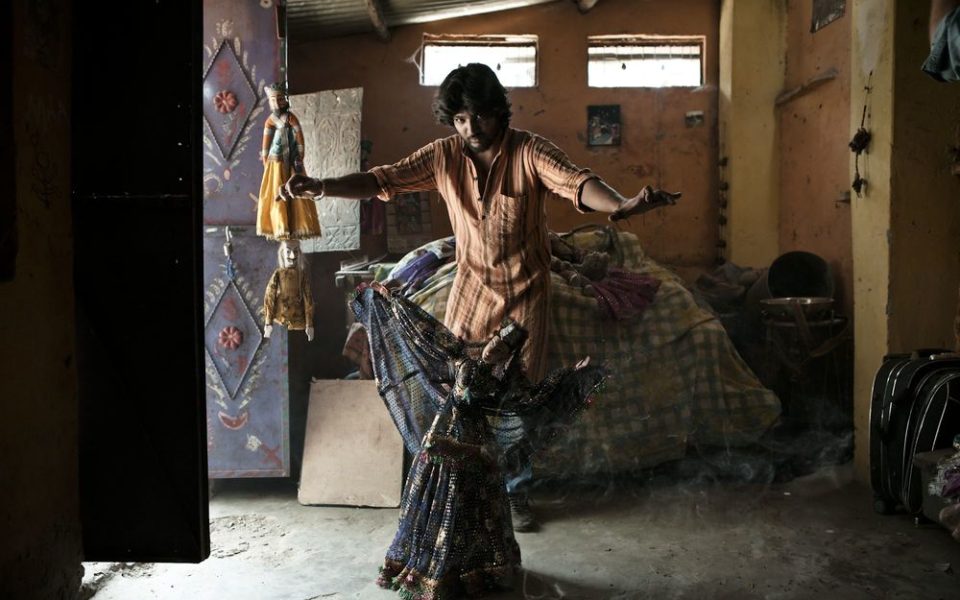Tomorrow We Disappear documents the forceful movement of an artist colony in New Delhi. (courtesy Photo)
by Daniel Wirtheim
What looks like an internment camp, with tightly spaced bunkers, white walls and blue roofs, spreads across the screen as Puran Bhatt looks like he might weep. He’s a lifelong member of the Kathputli Colony, which has agreed to live in the transitional camps for two years until they can find new homes but Bhatt knows it will be longer.
Tomorrow We Disappear is the 2015 documentary exploring the forced relocation of the Kathpulti Colony from their homes in a New Delhi slum into transitional camps miles away. It’s an effort to catalog the destruction of a once-praised artist colony and one of the eight films screened in the first annual South Asian Film Festival at A/perture Cinema in Winston-Salem.
Most of the films hailed from India but also included a couple of Pakistani films and a documentary on Malala Yousafzai, the youngest-ever Nobel Prize laureate, which will runs through Thursday.
Sukhada Gokhale, along with A/perture Cinema owner Lawren Desai, curated the festival. Gokhale is a filmmaker and educator from India who lives in Winston-Salem. Starting the annual South Asian Film Festival was her way of bridging the filmmakers she knows in India and an American audience. The well-attended festival took place on Oct. 9-11.
Gokhale wanted to make the festival inclusive with a film for children, Kaphal: Wild Berries. There was also a series of short films exploring various themes in India and Pakistan, including the Pakistani peace movement, an outsider becoming a regular at an Indian café, and a 13-year-old dealing with her parent’s divorce. But the last two feature films of the festival, which included Tomorrow We Disappear, showed how repressive India’s bureaucracy can be.
“We can just watch a short video on it, but I think it’s more meaningful when we have to sit for an hour and a half and feel it,” Gokhale said.
We see the pre-transitional-camp Kathpulti Colony through the eyes of Bhatt, a nationally recognized puppeteer. The people of the Kathpulti Colony live in an array of colorful shacks separate from the progressive inner New Delhi. The urban population sees the colony as a group of slum-dwellers.
But Bhatt presents Kathpulti as an artist community that overcomes poverty with rich storytelling and spirited performances. Close-ups show the astounded look on children’s faces as fire breathers shoot flames, others pound drums; the general sense is that there’s never a moment without some type of performance happening in Kathpulti’s narrow alleyways.
But the vibrant paint that adorns Kathpulti is fading. The children are dirty and the police are becoming increasingly strict on street performers. Developers want to build a skyscraper in its place and they have full support from the city.
In some ways, it’s the classic tale of gentrification. The developers arrive with clipboards, suits and ties and before anyone can digest what’s actually happening the city’s ordinance comes and the transitional camps are built.
There’s no official destination for the Kathpulti Colony, and morale is fading with the loss of their homes. Tomorrow We Disappear shows that as in any major country, India’s bureaucracy can cause irreparable harm. That was a recurring theme at the South Asian Film Festival.
Court, the 2014 Indian courtroom drama and India’s official 2015 selection for Best Foreign Language Film at the Academy Awards, also screened at the festival to a full theater. Court offers a more intimate look at the judicial process in India.
It follows the case of an aging folk singer charged with abetting suicide by influencing the death of a sewer cleaner through his lyrics. Court channels the quirky courtroom moments that most of the genre overlooks. Attorneys have papers falling out of their folders, courtroom speech is redundant and overly clarified, and no one is exceptionally articulate. At one point, a judge asks what a group of 20 or so people are doing standing in the back of the courtroom and an officer replies that they were sitting in the handicap car of a train. The judge fines them 500 rupees each and orders them to leave.
The legal system is revealed as ineffective and run by ludicrous figures who impose their own conservative bias on the artist’s criminal cases. Court gives the impression that the Indian judicial system depends on extortions from poor citizens and deliberately targets subversive artists, similar to what the Kathpulti community faces in Tomorrow We Disappear.
In the end, the accused folk singer is acquitted but soon after is arrested for no apparent reason other than being a general nuisance to the political system.
Court shows how the judicial system is a labyrinth. Nothing really makes any sense and once the hungry eyes of the law are set on a victim, the fate of the prey is virtually sealed.
As he sits in the new transit camp, the colony that Bhatt once loved is being demolished and he’s presented a government contract agreeing to the demolition of the Kathpulti houses and their subsequent movement to transitional camps. He’s not the jovial puppeteer from the beginning of Tomorrow We Disappear; he’s a man chased by the cold-blooded beast that is the state. He lights a cigarette, takes a painful moment and puts ink to paper.
‘He Named Me Malala’ the documentary on Malala Yousafzai is playing at A/perture Cinema through October 22.
Join the First Amendment Society, a membership that goes directly to funding TCB‘s newsroom.
We believe that reporting can save the world.
The TCB First Amendment Society recognizes the vital role of a free, unfettered press with a bundling of local experiences designed to build community, and unique engagements with our newsroom that will help you understand, and shape, local journalism’s critical role in uplifting the people in our cities.
All revenue goes directly into the newsroom as reporters’ salaries and freelance commissions.


Leave a Reply